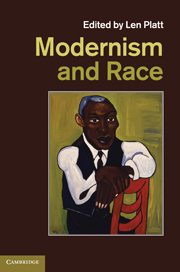Book contents
- Frontmatter
- Contents
- Notes on contributors
- Introduction
- 1 Germanism, the modern and ‘England’ – 1880–1930: a literary overview
- 2 ‘All these fellows are ourselves’: Ford Madox Ford, race and Europe
- 3 ‘’Tis optophone which ontophanes': race, the modern and Irish revivalism
- 4 Generating modernism and New Criticism from antisemitism: Laura Riding and Robert Graves read T. S. Eliot's early poetry
- 5 Race, modernism and the question of late style in Kipling's racial narratives
- 6 Atlantic modernism at the crossing: the migrant labours of Hurston, McKay and the diasporic text
- 7 Claude McKay in Britain: race, sexuality and poetry
- 8 Wyndham Lewis and the modernists: internationalism and race
- 9 ‘Until Hanandhunigan's extermination’: Joyce, China and racialised world histories
- 10 Race, gender and the Holocaust: traumatic modernity, traumatic modernism
- Index
- References
1 - Germanism, the modern and ‘England’ – 1880–1930: a literary overview
Published online by Cambridge University Press: 03 May 2011
- Frontmatter
- Contents
- Notes on contributors
- Introduction
- 1 Germanism, the modern and ‘England’ – 1880–1930: a literary overview
- 2 ‘All these fellows are ourselves’: Ford Madox Ford, race and Europe
- 3 ‘’Tis optophone which ontophanes': race, the modern and Irish revivalism
- 4 Generating modernism and New Criticism from antisemitism: Laura Riding and Robert Graves read T. S. Eliot's early poetry
- 5 Race, modernism and the question of late style in Kipling's racial narratives
- 6 Atlantic modernism at the crossing: the migrant labours of Hurston, McKay and the diasporic text
- 7 Claude McKay in Britain: race, sexuality and poetry
- 8 Wyndham Lewis and the modernists: internationalism and race
- 9 ‘Until Hanandhunigan's extermination’: Joyce, China and racialised world histories
- 10 Race, gender and the Holocaust: traumatic modernity, traumatic modernism
- Index
- References
Summary
The English descend from the people of Germany which were called Saxons. These by good Authors were esteemed the strongest and valiantist of its Nations, and are reported to have inlarged their bounds further than any other particular nation did in Germany, and carried the terror of their Arms into all parts that lay about them; but especially to have lorded it on the Seas. In a word, they were dreaded for their Arms and commended for their extraordinary Chastity: so that the English derive from a most noble and pure Fountain, being the off-spring of so valiant and chaste a people.
Richard Hawkins, A Discourse on the Nationall Excellancies of England (1658)Classical literary modernism, once conceptualised as a liberating culture of individualism, is sometimes characterised by ‘moments’ that appear to suddenly and sharply invoke the idea of race in ways that can now seem embarrassingly unsophisticated. They include the exotic otherness of Joseph Conrad's warrior queen emerging from the vast jungle ‘with a slight jingle and flash of barbarous ornaments … She was savage and superb, wild-eyed and magnificent’ and Henry James's report on Jewish areas of New York in The American Scene (1907). Here James describes:
a Jewry that had burst its bounds … It was as if we had been thus, in the crowded, hustled roadway where multiplication, multiplication of everything, was the dominant note, at the bottom of some vast sallow aquarium in which innumerable fish, of over developed proboscises, were to bump together, forever, amid heaped spoils of the sea. […]
- Type
- Chapter
- Information
- Modernism and Race , pp. 19 - 38Publisher: Cambridge University PressPrint publication year: 2011
References
- 1
- Cited by

